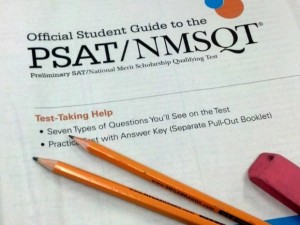Anthony-James Green is a world-renowned SAT and ACT tutor with over 10,000 hours of experience teaching these tests, crafting curriculum, and training other tutors to teach their own students. He is also the founder of TestPrepAuthority.com. CNN recently named Anthony: “The SAT tutor to the 1%”. He’s providing today’s post: The Ultimate Guide to the PSAT.
____________________
 Of all the standardized tests on the market today, few are less understood than the PSAT. Almost every client who comes my way has the
Of all the standardized tests on the market today, few are less understood than the PSAT. Almost every client who comes my way has the
same three questions about the PSAT:
1. What’s the difference between the PSAT and the SAT?
2. What’s the point of the PSAT?
3. How does my child prepare for the PSAT?
By the end of this short guide, you’ll know the answers to all three questions, and you’ll have an actionable plan that you can use to conquer this exam and get on with your life! Without further ado, let’s start The Ultimate Guide to the PSAT.
What’s the difference between the PSAT and the SAT?
The simplest answer to this question? Almost nothing. For all intents and purposes, the PSAT and the SAT are almost exactly the same test. The only differences between the two exams:
1. The PSAT doesn’t have an essay portion.
2. The PSAT is shorter.
The difficulty level of both exams is exactly the same, the material tested is the same, and the format is practically identical. The PSAT is just a shorter version of the SAT without the essay. Even the scoring is the same – while the SAT gives you an “out of 2400” grade, with three sections worth 800 points each, the PSAT gives you an “out of 240” grade, with three sections worth 80 points each. A 50 on the PSAT math section is a 500 on SAT math, a 67 in Writing is a 670 in SAT writing, etc. Which brings up a good question: if the two tests are so similar, what’s the point of offering the PSAT in the first place?
What’s the POINT of the PSAT?
The PSAT has two major purposes:
1. To give students and parents an idea of where their SAT scores currently stand.
In many ways, this is the most important aspect of the PSAT. Many parents assume that their children will get good SAT scores because they’re smart, hard-working kids with good grades. Here’s the issue: your SAT score has NOTHING to do with your academic performance. The SAT has a bizarre, unique format that tests a limited, extremely random assortment of information in intentionally confusing ways. I can’t tell you how many parents have said something like this to me:
“I can’t believe John got such a bad math score – he’s a great math student!”
SAT math and academic math are worlds apart. Just because your child is a “good reader” or “good in English” does not mean that he or she will get a good SAT Reading or Writing score.
The PSAT is a “wakeup call” for parents and students alike. If you know that you need 650+s to get into your target schools, and your PSAT scores are all in the 40-50 range, then it’s time to prep for the SAT! Since the PSAT is administered as a requirement but most schools in the country, it’s a helpful warning system for students across the country.
2. The National Merit Scholarship
Students who score in the top ~3% of their state’s population on the PSAT are considered for the National Merit Scholarship. Students who become National Merit Finalists are extremely coveted by competitive schools – the number of National Merit Finalists at any given school plays into the school’s ranking and prestige. Furthermore, students who get NMF status can receive grants and scholarships for their tuition. To learn more about this entire process, including the scores you’ll need, the process for becoming a finalist, etc., you can visit the official site here:
http://www.nationalmerit.org/
If you’re able to achieve NMF finalist status, you have an enormous leg up in the college admissions process. Not only will you potentially receive free money for college, but you’ll also have a much better chance of getting in (and, because PSAT scores are directly indicative of SAT scores, there’s a darn good chance that you’ll have high SAT scores, which are essential for competitive college admissions).
If you’re interested in competing for the National Merit Scholarship, the key is to start early. Getting a high SAT score takes time, diligence, and effective preparation. Which brings us to our third question:
How does my child prepare for the PSAT?
The same exact way that you prepare your child for the SAT! There’s literally no difference between an effective SAT prep program and an effective PSAT prep program. If you simply prep your child for the SAT, he or she will have all the skills necessary to crush the PSAT and compete for National Merit Finalist status.
However, there are a few key details that you’ll want to keep in mind:
1. Call your child’s school and find out exactly when the PSAT will be administered.
You need to think ahead, and it’s important that you know precisely when the PSAT will be given so that you can prepare accordingly.
2. Give your child at least two months to prepare.
A solid SAT prep program takes at least two months (and ideally four or five). If you have less time than this, all is not lost – but you need to get started immediately.
3. Avoid classroom SAT courses like the plague.
Countless studies have shown how remarkably ineffective these courses are. Choose either an online, self-directed course, or, if you have the means, get a reputable one-on-one SAT tutor. Never spend your money on SAT classroom courses, which charge you upwards of $1,000 to read a book out loud to your child.
4. No matter which prep option you choose, be sure that it has both an excellent track record of results and extensive testimonials and references.
There are few barriers to entry in the SAT prep space, and literally anyone can become a tutor, write a book, or craft a program. No matter which online course or tutor you choose, be sure that you know exactly what past students have experienced, and be sure that the option comes highly recommended.
That’s all there is to it!
The PSAT is simply a “warm up” for the SAT, but if you do well, you’ll be able to achieve scholarships, gain a leg up in the admissions process, and get a headstart on your SAT prep. If you’re interested in shooting for a NMS Finalist position, get started as soon as possible.
Thanks so much for reading my guide, and good luck with your prep!
 The college application season is now in full swing and if you listen closely enough, you might be able to make out the tap-tapping of millions of seniors across the globe writing their application essays. If you happen to be one of those students or a parent of one, I’d like to introduce you to Edswell, an application essay management tool that makes the whole process a lot easier.
The college application season is now in full swing and if you listen closely enough, you might be able to make out the tap-tapping of millions of seniors across the globe writing their application essays. If you happen to be one of those students or a parent of one, I’d like to introduce you to Edswell, an application essay management tool that makes the whole process a lot easier. Alex Thaler is the CEO of Edswell and the author of “The Art of the Personal Statement.” He received his BA from UC Berkeley and JD from University of Pennsylvania. In his non-existent spare time he enjoys woodworking and dreaming about moving to Hawaii.
Alex Thaler is the CEO of Edswell and the author of “The Art of the Personal Statement.” He received his BA from UC Berkeley and JD from University of Pennsylvania. In his non-existent spare time he enjoys woodworking and dreaming about moving to Hawaii.

 Of all the standardized tests on the market today, few are less understood than the PSAT. Almost every client who comes my way has the
Of all the standardized tests on the market today, few are less understood than the PSAT. Almost every client who comes my way has the







